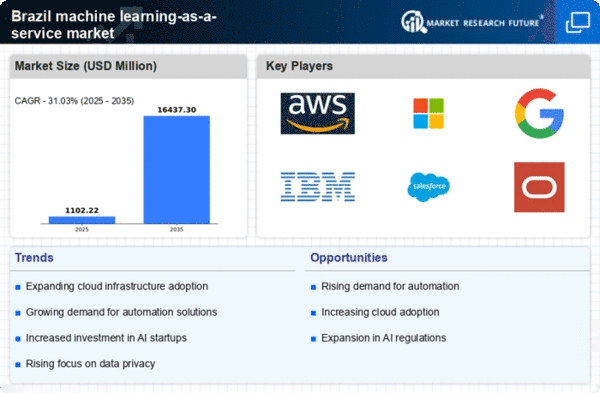Expansion of Cloud Infrastructure
The expansion of cloud infrastructure in Brazil is a critical driver for the machine learning-as-a-service market. As cloud service providers enhance their offerings, businesses are increasingly migrating to cloud-based solutions for their machine learning needs. This shift allows organizations to access powerful computing resources without the need for significant upfront investments in hardware. In 2025, the cloud computing market in Brazil is projected to grow by approximately 20%, facilitating the adoption of machine learning-as-a-service solutions. The scalability and flexibility offered by cloud platforms enable businesses to experiment with machine learning applications, thereby accelerating innovation and driving market growth.
Rising Demand for Data-Driven Insights
The machine learning-as-a-service market in Brazil is experiencing a notable surge in demand for data-driven insights. Organizations across various sectors are increasingly recognizing the value of leveraging data analytics to enhance decision-making processes. This trend is particularly evident in industries such as finance, healthcare, and retail, where data-driven strategies are becoming essential for competitive advantage. According to recent estimates, the market for data analytics in Brazil is projected to grow at a CAGR of approximately 25% over the next five years. This growing appetite for actionable insights is likely to propel the machine learning-as-a-service market, as businesses seek to harness advanced algorithms and predictive analytics to optimize operations and improve customer experiences.
Growing Focus on Automation and Efficiency
The push for automation and operational efficiency is driving growth in the machine learning-as-a-service market in Brazil. Companies are increasingly adopting machine learning solutions to automate routine tasks, streamline processes, and reduce operational costs. This trend is particularly pronounced in sectors such as manufacturing and logistics, where efficiency gains can lead to substantial cost savings. In 2025, it is estimated that organizations utilizing machine learning for automation could achieve cost reductions of up to 30%. As businesses strive to enhance productivity and remain competitive, the demand for machine learning-as-a-service solutions is expected to rise, enabling them to leverage advanced technologies for improved operational performance.
Investment in AI and Machine Learning Startups
Brazil is witnessing a significant influx of investment in artificial intelligence and machine learning startups, which is positively impacting the machine learning-as-a-service market. Venture capital firms and private investors are increasingly funding innovative companies that specialize in machine learning technologies. In 2025, investments in AI startups in Brazil are expected to reach around $1 billion, reflecting a growing confidence in the potential of machine learning applications. This influx of capital not only fosters innovation but also enhances the availability of machine learning solutions for businesses of all sizes. As startups develop new tools and platforms, the machine learning-as-a-service market is likely to expand, providing organizations with more options to integrate machine learning into their operations.
Increased Collaboration Between Academia and Industry
The collaboration between academic institutions and industry players in Brazil is fostering advancements in the machine learning-as-a-service market. Universities and research centers are increasingly partnering with businesses to develop cutting-edge machine learning technologies and applications. This synergy not only enhances the talent pool available to the industry but also promotes the transfer of knowledge and innovation. In 2025, it is anticipated that collaborative projects will lead to the development of new machine learning models and algorithms tailored to local market needs. Such initiatives are likely to strengthen the machine learning-as-a-service market, as they provide businesses with access to state-of-the-art solutions that can be implemented to address specific challenges.
















